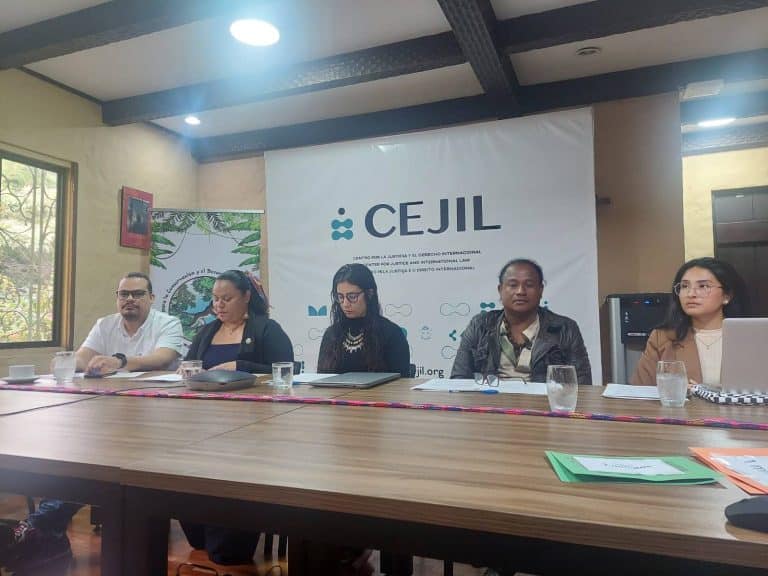15 de julio 2024

Children of Exile: The Births “Sowing Hope” in the Camp of Nicaraguan Farmers

PUBLICIDAD 1M
PUBLICIDAD 4D
PUBLICIDAD 5D
They urge financial organizations and international cooperation mechanisms to condition loans on respect for human rights

Organizations defending the rights of indigenous peoples in Nicaragua denounced the violence against the Mayangna and Miskitu peoples of the Northern Caribbean Region of Nicaragua, which has intensified since 2018 due to a process of “colonization” that, combined with the socio-political crisis facing the country, has brought the communities, in their own words, to the brink of an “ethnocide.”
The complaint was filed during a hearing in the 190th session of the Inter-American Commission on Human Rights (IACHR) on Thursday, July 11, 2024.
Exiled Nicaraguan Tininiska Rivera, daughter of the Miskitu indigenous political leader Brooklyn Rivera, said that the colonization process towards the indigenous peoples of the Northern Caribbean Coast continues to worsen, illustrated, she noted, by land dispossession and the imposition of parallel and allied indigenous authorities by the government.
The goal, Rivera indicated, is to nullify indigenous autonomy, facilitate resource control, and perpetuate state impunity.
She also asserted that the government led by Daniel Ortega has not complied with the cleaning of indigenous territories ordered by the Inter-American Court of Human Rights (IACHR Court), leaving about 304 communities vulnerable to invasions.
Meanwhile, Camila Ormar, a lawyer from the Center for Justice and International Law (CEJIL), stated that the escalation of violence against these indigenous peoples is manifested in the criminalization of leaders and defenders of the territory, especially in the Mayangna Sauni As and Wangki Li Aubra territories, whose communities are beneficiaries of protection measures.
The state stigmatizes them as criminals to facilitate land takeovers, Ormar claimed, and denounced that in the first six months of 2024, there were 37 cases of criminalized rangers, with unfair trials and inhumane treatment in prison.
Additionally, according to the complaint, the state promotes foreign investment through the illegal sale and leasing of indigenous territories, promoting extensive cattle ranching and extractive activities.
Rendel Hebertt Lopez, a Mayagna Ulwa indigenous representative from the Legal Assistance Center for Indigenous Peoples (CALPI), stated that between 2007 and 2022, the mining sector received 2.524 billion dollars in foreign direct investment, mainly from Chinese, Canadian, and Colombian capital.
“They establish themselves in Miskitu and Mayagna territories without conducting consultations. Concessions are granted by the state with the support of regional, municipal governments, and imposed authorities in Indigenous Territorial Governments, who coerce the indigenous population to simulate consent,” Hebertt López denounced.
In this regard, the IACHR rapporteur for Nicaragua, Arif Bulkan, expressed concern about the “shameless response” of countries in the region considered “champions of human rights,” but continue to collaborate with the Nicaraguan state in terms of their mining companies, such as Canada.
“A clear line of work for this Commission should be to continue influencing the international community. To work on isolating this brutal dictatorship,” Bulkan noted.
Commissioner Carlos Bernal, for his part, described as “paradoxical” the fact that documented human rights violations contrast with reports of the “good investment climate” promoted by the Nicaraguan government, as well as the interest of foreign investors – particularly in the mining sector – who want to exploit natural resources.
According to Bernal, these investments come “at the expense of the human rights of indigenous, peasant communities and people oppressed by the regime.”
“I want to remind that respect for human rights is a component of corporate sustainability. Those companies that are investing in Nicaragua at this human rights cost will have to be responsible for this exploitation and this use with the regime’s platform,” Bernal emphasized.
The indigenous people called on financial organizations and international cooperation mechanisms to reinforce conditioning policies when granting any type of financing or credit to the Nicaraguan state, ensuring compliance with its human rights obligations, especially concerning indigenous peoples.
This article was published in Spanish in Confidencial and translated by Havana Times. To get the most relevant news from our English coverage delivered straight to your inbox, subscribe to The Dispatch.
PUBLICIDAD 3M
Agencia de noticias internacional con sede en Madrid, España. Fundada en Burgos durante la guerra civil española en enero de 1939.
PUBLICIDAD 3D